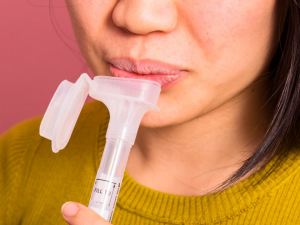DNA Testing

DNA testing, otherwise referred to as genetic testing[1], refers to the acquisition and analysis of DNA for academic, clinical and commercial purposes. Reasonings for using this form of test may vary as it caters to: (1) predict or diagnose genetic disease and drug responses in humans, (2) identify predispositions toward specific behaviors, (3) selectively breed plants and animals to develop particular characteristics, and (4) determine ancestry or paternity - among others.
DNA can be acquired via hair, skin, amniotic fluid, blood, and cheek swab samples; however, test recipients must first provide informed consent[2]. Medical practitioners (i.e., doctors, genetic counselors, technicians) utilize DNA sequencing to identify specific mutations and abnormalities in an individual’s chromosomes, proteins or genes. Ethical implications of DNA testing include the insecurity or selling of DNA data to third parties without the consumer's knowledge, as well as the potential abuse, misuse or misinterpretation of DNA data.
Contents
Commercial Use (Direct-To-Consumer)
Genetic genealogy and/or personal genomic[3] companies - like Ancestry and 23andMe - have recently become popularized. Currently, it is not unusual to receive a DNA testing kit as a gift. These privately held companies provide consumers with access to DNA testing, so that consumers are no longer required to ask a healthcare professional to order the test for them, should they so desire. Direct-to-consumer (DTC) DNA testing may encourage individuals to be more proactive with respect to their health and well-being, and is often less expensive than the alternative: genetic testing through a healthcare professional. However, DTC genetic testing is not considered to be diagnostic, in that “it cannot be used to diagnose any disease or a condition[4]." Therefore, consumers run the risk of making “important decisions about disease treatment or prevention based on inaccurate, incomplete or misunderstood information from their results[5]." Ultimately, experts maintain that DTC genetic testing is not as comprehensive as genetic workups ordered through healthcare professionals - and therefore, should not be used for "anything beyond entertainment"[6].

Moreover, consumers most likely don't understand the privacy policies of these private DTC genetic testing companies. This may be an issue, seeing as there are numerous risks to sharing your genetic information. It is important that consumers question how their genetic information is treated by DTC companies (i.e., safe handling of DNA samples, secure data storage). When choosing a company, consumers should also consider the extent to which their genetic information is protected from the following: changes to privacy policies, the demise of the business, malicious actors (hackers), and/or the selling to third parties. According to Newstex Global Business Blogs, “In July, 23andMe announced a partnership with GlaxoSmithKline through which the pharmaceutical company will use home DNA results from 23andMe's 5 million customers for new drug research.[7]." These customers may not have realized that by sending a DNA sample to 23andMe, they allowed the company to profit off of their genetic information. Law enforcement has been pressuring companies into sharing genetic information via warrants and court orders [8]. It is evident that consumers has lack of control in regards to their genetic information and would anticipate this type of situation taking place.
The Need for Oversight
There are many critics who believe that government regulation and oversight of private DTC genetic testing companies is lacking. The Genetic Information Nondiscrimination Act (GINA) is the only existing law that addresses this concept of genetic privacy. There are concerns among privacy experts regarding GINA’s narrow scope - which is limited to prohibiting health insurance companies and employers from exploiting an individual’s genetic information. As a result, health insurance companies can not deny coverage based on an individual’s genetic information. Also, employers cannot consider genetic information of an individual when making decisions (i.e., firing, hiring, promotion) [9]. Users who take the DNA test kits still have to be cautious and aware that companies disclosed the fact that based on certain results, insurance prices could increase by asking for this prevalent information. Yet, this policy vacuum may help prompt the abuse of genetic privacy by a variety of actors. Without sufficient regulation, we may find ourselves under “genetic surveillance”[10]. As described earlier, law enforcement (and governmental organizations) have conducted searches of DTC databases of genetic information - without the consumer’s knowledge or consent.
Moreover, the insufficient regulation of DTC companies has allowed for poor maintenance of data: a failure to effectively “de-identify” genetic information, more than the simple removal of the individual’s name and address. Research suggests that it is still “possible to discover a study participant’s identity by cross-referencing research data about him and his DNA sequence… [with] genetic geneology and public-records databases[11].”
Additionally, the exploitation of an individual’s genetic information can be attributed to the absence of a definition of its legal “owner”. This notion mirrors Floridi’s ownership-based interpretation (with respect to the value of informational privacy), which argues that “a person is said to own his or her information (information about him- or herself)[12].” Should this be resolved, and the consumer (the individual who provides the DNA sample) is determined as the legal owner of his or her own genetic information, DTC genetic testing companies would likely have a more difficult time abusing or exploiting the information.
Ethical Implications
Lack of Scientific Backing
23andMe's original launch included the results of their testing for predisposed genetic conditions.[13] While it is true that genetic markers for these conditions exist, lifestyle also contributes a very significant amount to this risk which 23andMe did not and could not factor in telling the risk of genetic conditions to the users of their genetic testing kits. Making people think that they are likely to develop some genetic disorder is a misuse of their position and they are disguising the truth in favor of commercial gain.
Security
The potential for the tracing back to - or the identifying of - the individual (from their genetic information) remains a significant ethical issue that casts a large shadow over DTC companies. According to Wired, “more than 60 percent of Americans with European ancestry can be identified through their DNA using open genetic genealogy databases, regardless of whether they’ve ever sent in a spit kit[14].” Genetic databases are essentially so large that it no longer matters if an individual has willingly submitted a DNA sample, he/she can still be identified. Should a genetic database be hacked, the personal genomic information of a large population can be compromised and/or abused for malicious - even frightening - purposes. Simply put, there is a legitimate risk that our genetic information can be leveraged against us.
Privacy
Further, the protection of informational privacy, according to Norman Mooradian, is crucial for a functioning society. On an individual level, an intrusion of privacy limits one's ability to form and maintain relationships. He explains, "individuals need to be able to control or restrict access to themselves and the spaces in which they conduct their relationships. If they do not have such control, they may be unable to engage in the behaviors constitutive of the specific kind of relationship[15] ." Ultimately, if DTC companies fail to respect the informational privacy of its consumers, and genetic information were to become available to the public, government or private companies, we would likely see a breakdown of trust in relationships and in institutions.
Genetic Discrimination
Genetic discrimination is institutional discrimination characterized by the refusal or approval of certain individuals to qualify for certain health-related assistance programs based on their genetic genotype health risks. Insurance companies and private employers are more apt to make decisions based off associated diagnosis of a genetic abnormality found in an individual's genotype than the actual state of the individual's health, which can limit the access of healthcare related opportunities for individuals with a genome containing health risks.[16]
Autonomy
Individuals who choose to participate in DNA tests are also faced with an ethical decision when they receive their results. When testing for malignant genetic mutations, if revealed to be a carrier of these genes they struggle to balance autonomy and responsibility. On the one hand, for participants who are told they hold diseases that are easily passed down through generations, they have the responsibility to inform their kin of this information so they can act accordingly. On the other hand, autonomy grants individuals the right to choose whether they want to be informed about their genetic information and make decisions based upon it without interference by others.[17]
Right to Inform
Ethical friction between patient and the physician can arise under the circumstance that another family member's physician assists. The physician has access to the confidential data of the main patient, but the ethical grounds for disclosing this information to other family members is ethically grey and can only be dealt with through legislation.[18]
References
- ↑ https://en.wikipedia.org/wiki/Genetic_testing
- ↑ https://en.wikipedia.org/wiki/Informed_consent
- ↑ https://en.wikipedia.org/wiki/Personal_genomics
- ↑ https://ghr.nlm.nih.gov/primer/dtcgenetictesting/dtccost
- ↑ https://ghr.nlm.nih.gov/primer/dtcgenetictesting/dtcrisksbenefits
- ↑ Brodwin, E. (2019, January 12). Genetic testing is the future of healthcare, but many experts say companies like 23andMe are creating more harm than good. Retrieved from https://www.businessinsider.com/future-healthcare-dna-genetic-testing-23andme-2018-12
- ↑ 3BL blogs: DNA testing is popular, but many are unaware of privacy concerns (2019). Chatham: Newstex. Retrieved from http://proxy.lib.umich.edu/login?url=https://search-proquest-com.proxy.lib.umich.edu/docview/2172287749?accountid=14667
- ↑ Selk, A. (2018, April 28). The ingenious and 'dystopian' DNA technique police used to hunt the 'Golden State Killer' suspect. Interestingly, they had the opportunity to connect the dots as he wasn't in the database. However, a distant relative was in the database and his DNA partially matched the DNA of the 'Golden State Killer' suspect. Retrieved from https://www.washingtonpost.com/news/true-crime/wp/2018/04/27/golden-state-killer-dna-website-gedmatch-was-used-to-identify-joseph-deangelo-as-suspect-police-say/?noredirect=on&utm_term=.ea018eefb50c
- ↑ https://en.wikipedia.org/wiki/Genetic_Information_Nondiscrimination_Act
- ↑ Molteni, M. (2018, October 11). Genome Hackers Show No One's DNA Is Anonymous Anymore. Retrieved from https://www.wired.com/story/genome-hackers-show-no-ones-dna-is-anonymous-anymore/
- ↑ Privacy loophole found in genetic databases. (n.d.). Retrieved from https://www.nature.com/news/privacy-loophole-found-in-genetic-databases-1.12237
- ↑ Floridi, Luciano. 2014. “Privacy: Informational Friction,” in Floridi, The Fourth Revolution
- ↑ Boddy, J. (2017, April 07). FDA Approves Marketing Of Consumer Genetic Tests For Some Conditions. Retrieved from https://www.npr.org/sections/health-shots/2017/04/07/522897473/fda-approves-marketing-of-consumer-genetic-tests-for-some-conditions
- ↑ Molteni, M. (2018, October 11). Genome Hackers Show No One's DNA Is Anonymous Anymore. Retrieved from https://www.wired.com/story/genome-hackers-show-no-ones-dna-is-anonymous-anymore/
- ↑ Mooradian, Norman. 2009. “The importance of privacy revisited.” Ethics and Information Technology 11:163-174.
- ↑ Billings PR, Kohn MA, de Cuevas M, Beckwith J, Alper JS, Natowicz MR. Discrimination as a consequence of genetic testing. Am J Hum Genet. 1992;50(3):476–482.
- ↑ Hallowell, N. “Balancing Autonomy and Responsibility: the Ethics of Generating and Disclosing Genetic Information * Commentary * Authors Reply.” Journal of Medical Ethics, vol. 29, no. 2, 2003, pp. 74–79., doi:10.1136/jme.29.2.74.
- ↑ Bioethics for clinicians: 14. Ethics and genetics in medicine M. M. Burgess, C. M. Laberge, B. M. Knoppers CMAJ May 1998, 158 (10) 1309-1313;